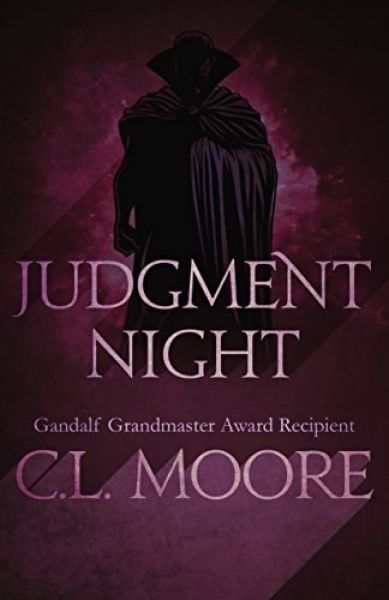Born to Die
Judgment Night
By C L Moore

22 Jan, 2017
Because My Tears Are Delicious To You
0 comments
C. L. Moore’s short novel Judgment Night was serialized in two issues of John W. Campbell’s Astounding back in 1943. Judgment Night is also the title of a collection published by Dell back in the Disco Era (which is how I encountered the story) .. but the edition I have in hand is Diversion Books’ 2015 ebook. They’ve presented the novel as a standalone — which it is. Not only are there no sequels of which I am aware, it’s not clear to me how there could be.
The race that holds Ericon holds the galaxy, because the race that holds Ericon can draw on the wisdom of the Ancients. Access to the Ancients does not mean that one will be able to put their wisdom to effective use. In fact, dynasty after dynasty have interpreted the advice they were given in ways that led to their doom. All human governments are as mortal (if not so short-lived) as their members.
Our protagonist, Juille, believes that she can defy fate.
Juille is the emperor’s daughter and heir apparent. She is determined that her father’s Lyonese Dynasty will shall not end under her family’s watch. Her father has convinced himself that he can somehow negotiate peace with the barbarian H’vani. Juille, who has trained as a warrior since childhood, believes that the key to survival is complete and utter ruthlessness. Her father hesitates because he fears all-out war with the H’vani could bring a thousand years of darkness. Juille believes that victory is worth any cost; it justifies any ruse and any weapon.
The H’vani have their own visionary, a man much like Juille. Egide understands his people’s shortcomings and yet wants for them the glory that the Lyonese have, the glory the Lyonese stole from the Andareans before them. For the H’vani to rise, the Lyonese must fall. Egide is just as willing as Juille to go to any extreme for the sake of his people, with one significant difference: he wants to shape his people’s destiny, but does not insist on personal glory. Juille, in contrast, wants to win and to be seen winning.
Both of them will find their way to the pleasure world of Cyrille. It is by Egide’s choice that the two meet and spend time together. Egide may find himself torn between duty to his race and admiration for his enemy. Juille? She cannot be persuaded or seduced. Only death can put an end to her plans.
~oOo~
The situation the Ancients find themselves in explains why in so many continuities the great ancient races decide to sublime or emigrate to another dimension or some other life choice that makes it harder for junior races to get their grubby hands on the Ancient’s clean trouser leg.
Both Juille and Egide are determined to win at all costs. The results of their conflict are not at all the ones for which they hoped. I wonder how this read, back in 1943, in the middle of a Great War. The Great War.
You might think that because this was written in the first half of the last century that you know how “the emperor’s daughter meets the hunky young leader of the enemy” has to play out. Just remember that Moore is the same author who once had her heroine feed the man she (just a bit too late) realized she loved to a demon. “If you do not treat my protagonists nicely,” one can hear the author saying, “to the demons with you.” Moore’s women protagonists1 are proof against infatuation; not so her men.
It’s weird that even though the humans know that every previous dynasty has eventually succumbed to the“a great empire will fall” trick, none of them seem able to avoid that very pitfall.
Why? In Juille’s case, it’s clear that she can read the oracle only one way because she cannot conceive that she might be wrong. I understand this completely: All too often I have to deal with people just like Juille, people who inexplicably fail to understand that I am right and they are wrong. I feel sorry for them, but I do not hesitate to take the correct action. Because I’m right.
It’s interest that the oracles in this book are neither powerless (like Cassandra ) nor detached from the results (like the oracles at Delphi). Rather, they are increasingly annoyed that nobody ever seems to learn from experience2. It’s not as if the Ancients don’t provide clear warnings, either. They will happily tell their clients that bad choices will have unfortunate outcomes, that the choices most emotionally pleasing to the clients are also the wrong choices. Even the Ancients are helpless in the face of human folly. But the Ancients do have coping mechanisms. Read the story and find out what they are.
Judgment Night is available here.
1: Women playing the role of supporting characters are a different story. Pity the women who encountered Moore’s hunky but useless Northwest Smith. Those stories generally ended badly — but not for Smith.
2: Or, like Juille’s father, are prevented from acting on what they’ve learned.
